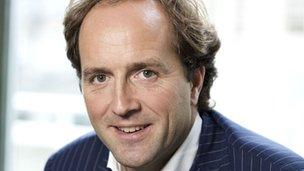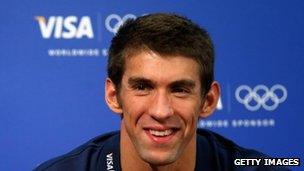Advertising world 'transformed by social media'
- Published

While criticising Visa, Mr Jones praised British Airways for its Olympic adverts
The advertising industry has been transformed by social media, says David Jones, boss of global agency Havas.
Speaking to BBC Radio 4's Today programme, he said the development of the likes of Facebook and Twitter meant the sector needed to be more "open and collaborative".
He also said that social media meant companies had to re-evaluate how they approached sponsorship deals.
In particular, he criticised Visa's sponsorship of the 2012 Olympic Games.
Under the terms of Visa's exclusivity agreement with the games, its cards are the only ones which can be used to buy tickets, or are accepted at the Olympic venues.
Mr Jones said this had annoyed people. Visa has declined to comment.
'Agile advertisers'
Thanks to social media, companies can now connect directly - and cheaply - with customers.
Mr Jones denied that this meant that the advertising industry was becoming irrelevant.
"What has happened with the digital and social media revolution around our industry is that it has actually made it more relevant and not less relevant," he said.
He said this was shown by the fact that the advertising sector now outperforms the wider economy, whereas it used to track it.
Yet he admitted that social media was a risk for the very largest advertising companies who were not quick or nimble enough to react.
"You need to be big in global [advertising] today, but you also need to be entrepreneurial, agile and integrated."
Brand damaging
Regarding Visa, Mr Jones said: "Clearly the sponsor is spending a lot of money, and they would like some rights and privileges for that.

Visa's image has been prominent at the Olympics
"But to actually go to the extent of only allowing Visa payments to be made at the Olympic stadiums and sites, to remove all the other cash machines that are non-Visa actually starts to really annoy people.
"And there are lots of signs around the Olympic Park saying 'we are proud to only accept Visa'. This is so out of touch with what is in people's heads.
"My view would be that Visa will probably end up damaging themselves through what they have done, rather than enhancing the brand."
Mr Jones added: "Social media has dramatically changed the world, and whilst you can lock down and censor, if you like, the venues, it is hard to lock down and censor and prevent things from happening in social media."
David Jones: The rules of advertising are all about being open
Visa spent a total $100m (£64m) to sponsor both the 2010 Winter Olympics in Vancouver and 2012 Games in London.
Mr Jones said that in the future, the International Olympic Committee (IOC) had to move away from such strict advertising deals.
"There is a hell of a lot of good going on in and around the Olympic movement, but if they are not careful they are actually going to start causing problems for themselves, because the people who do worst out of the sponsorship will be the actual sponsors.
"The reason you want the exclusivity is to benefit the brand, and if you take the exclusivity so far that it actually damages your brand you are spending a huge amount of money to not achieve the objective."
'Censorship'
Turning his attention to successful Olympic-linked advertising, Mr Jones highlighted British Airways, which urged its customers to watch the Games instead of travelling.
"I think for me personally, British Airways' campaign I really liked - telling people not to travel," he said.
"They kind of get the gold medal for understanding their target group - that people aren't going to be wanting to travel away when this amazing event is happening.
"And I think they show they actually get what is in people's heads."
- Published3 August 2012
- Published31 July 2012
- Published18 July 2012
- Published18 April 2012